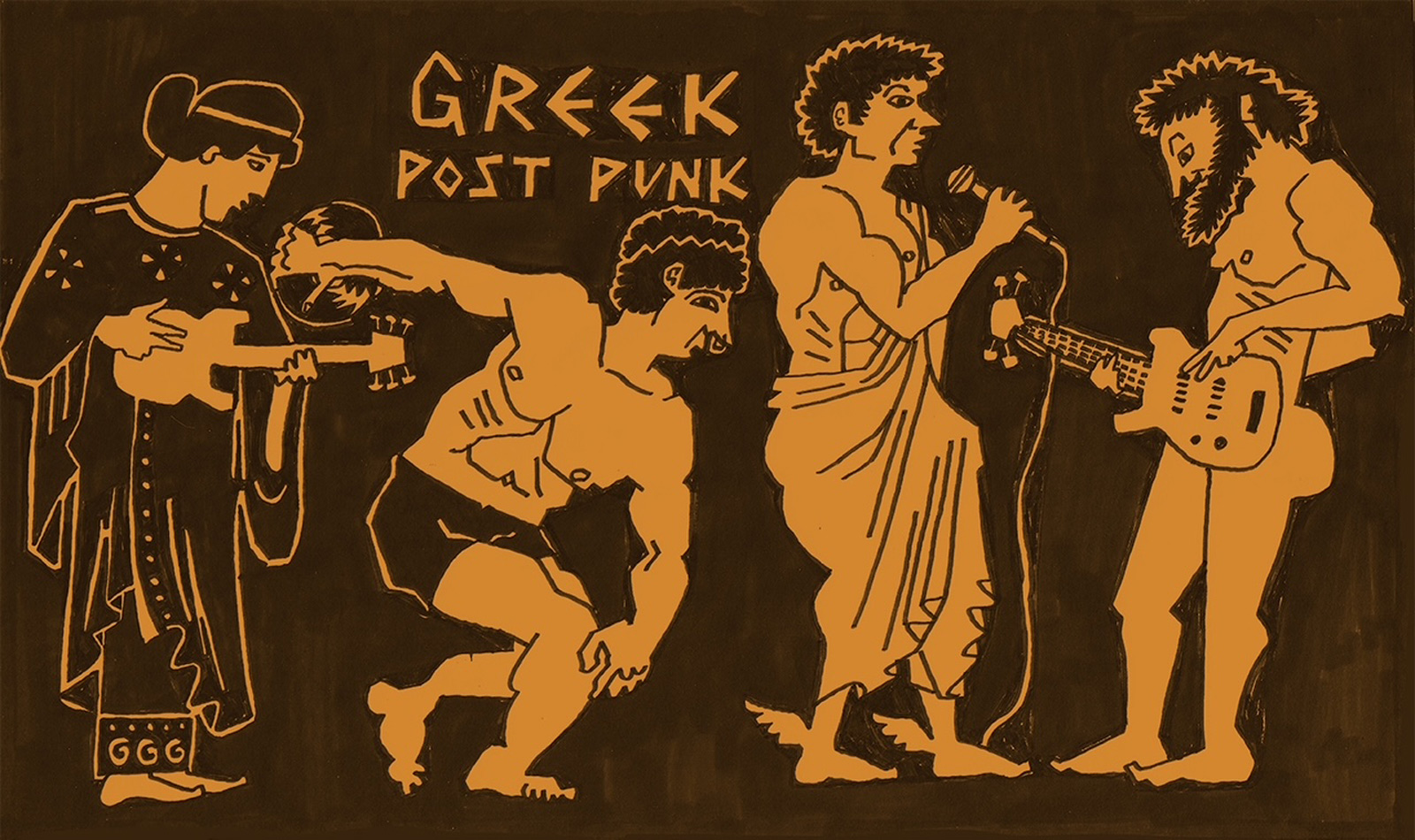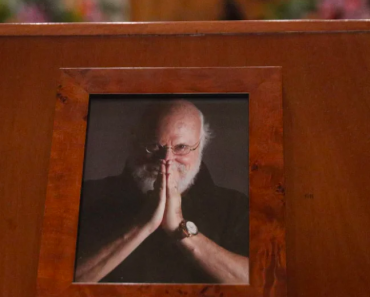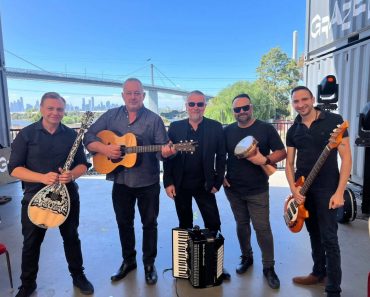By
·
Illustration by
·
October 16, 2025

In the 1980s, Europe played a major role in the development of post-punk and new wave, with popular acts hailing from places like Switzerland, Iceland, and Germany. But it was different for Greece. While the country was home to a passionate, innovative post-punk movement, the scene itself remained fairly insular. The bands that came up in Athens, Thessaloniki, and Patras were geographically isolated from both major labels and reliable distribution, which meant that even the most popular acts were DIY by necessity. Self-released records, tapes, and zines over time became proper labels and record stores, but the devotion to regionality remained. These independent production methods also influenced the collective sound, which often featured four-track recordings, analog synths, and a tendency towards minimalism.
Another important quality of Greek post-punk was its use of English lyrics, even though English is a second language for most of the country. The “English-speaking” philosophy can be summed up by zinester Babis Argyriou, who wrote in 2007, “we sing in English because we are interested in using the voice as an instrument. Because we don’t want people to pay attention to the words (which are not our strong point), but to the music.” The few bands that decided to sing in Greek did so to emphasize their words.
Although many of the scene’s original labels, such as the foundational Creep Records, are no longer with us, their work lives on in new forms. Reissue labels such as Minimal Wave, Eirkti, and Geheimnis are putting this music into new hands, while some of the original artists from the ’80s have kept detailed archives themselves. And now, 40 years later, lost rarities are being heard for the first time.
Re-releases
Yell-O-Yell
XIII
Creep Records was founded in 1982 by Babis Dalidis as a way to distribute his friends’ music. The result was 20 releases, and a reputation for being Greece’s post-punk tastemakers. The first group to sign was Yell-O-Yell, led by charismatic singer/guitarist Fill Scars. Yell-O-Yell’s sparse gothic chants flirted with industrial experimentation and was described as “Gang of Four meets Birthday Party and Iggy and Johnny lurk in the corner.” Later, the bassist of fellow Creep act Headleaders joined the band, but the label’s shuttering in 1986 meant that the group had to find a new home. That same year, Yell-O-Yell was one of the three bands to release music on Smash Records, a label whose impact was much larger than its output, and is often cited as an equal to Creep. Smash was revived in 2012, and is still active today under new leadership, reviving classics and supporting the next generation.
Magic De Spell
Nightmare EP
Magic De Spell was the Greek scene’s most prolific band, with more than 10 studio albums to their name. The band’s first 7-inch EP, Nightmare, bore the influence of British punk, with fast, tight songs like the whistling “Poor Johnny’s Lonely Blues” and anxious “Sweating All Over.” A compilation by reissue label Geheimnis was released to celebrate the single’s 30th anniversary, and includes extra songs from a comp put together by their original label, Happening Records, as well as six unreleased tracks from the Nightmare sessions.
Not Only Bones
Not Only Bones
Not Only Bones, the duo of Iannis Raikos and Philippe Mignon, self-released two cassettes in the mid-‘80s using avant-garde production tactics and a wide arsenal of analog synths. Raikos’s role as “background ambiance” creator was an essential counterpart to Midnon’s “music.” Their resulting “sound-jigsaw book” is haunting and precise, with a tactile quality due to home recording. “No Record Companies Wanted” was the postscript to the original release of their self-titled debut; but times changed, and Geheimnis remastered the album on vinyl for the first time in 2012.
Plastic Dolls
The End
Plastic Dolls only released one single, but the minimal wavers from Patras live up to the song’s title: “Don’t Forget Me.” The crunchy synths and dual vocals create the perfect combination of quaint and futuristic. The group self-released their music via their own Violent Crime Records before being picked up by Wipe Out!, an independent label from Piraeus, to publish more copies. Decades later, the label Eirkti found two unheard tracks to add to their reissue. Poppier than their predecessors, they demonstrate a breadth of styles from an act that was only getting started when they decided to call it a day.
Metro Decay
“Σκιές” b/w “Κειμήλια”
Metro Decay’s small discography—just one 7-inch and one LP—was originally issued by Creep in 1984 and made it to Eirkti in 2014. The group formed in their last year of high school; none of the members knew how to play an instrument—aside from someone’s 15-year-old brother on guitar. This fresh perspective helped build the new wave arm of the Greek underground, taking influences from the Cure and singing entirely in Greek, dark and danceable with a romantic touch. Although their debut was well received, military service became a wrench in the band’s progress. They attempted to regroup a few times—even once with English lyrics—but the impact was not the same as their bold early statement.
ΑNTI…
ΑNTI..
Long before the kids were making “egg punk,” ANTI…’s synthetic aggression was the most frenetic to be found within the Greek scene. Inspired by the Anti-Nowhere League (hence the name), the three members of ANTI… and their drum machine were known for raucous behavior and dizzying live performances. Their choice to sing in Greek was a political one, a direct response to the English speakers who dominated the larger scene. ANTI… made their first appearance on a compilation in 1986 before self-releasing their first cassette that same year, (it included 10 songs, two inserts, and a stick of gum). The album was released on vinyl by Eirkti in 2011, with two subsequent rounds of repressing due to high demand.
Rarities
In Trance 95
The Move
Bonding over Kraftwerk, OMD, and Solid Space, teenagers Alex Machairas and Nik Veliotis used analog synthesizers to create some of Greece’s first EBM in the latter half of the ’80s. The textural dance made by In Trance 95 first descended on the public with debut single “Desire To Desire” b/w “Brazilia,” released on Wipe Out! in 1988. The band lasted through the mid-’90s and reunited in 2010 to open for Depeche Mode’s Alan Wilder. This past May, In Trance 95 made their first U.S. appearance to celebrate the 20th anniversary of Minimal Wave, the label that has reissued two albums of their rarities. Cities of Steel and Neon features 12 unreleased four-track songs from 1988 to ‘89, and the new EP, The Move, extends into their work from the ’90s.
Villa 21
Voodoo Baby
One of the reasons Creep Records closed was because its founders’ own band, Villa 21, started gaining more traction. The group was led by Kostas Pothoulakis, who performed under the pseudonym Fever. The band’s name and lyrical inspiration came from the work of David Cooper, a British “anti-psychiatrist” who treated young people with schizophrenia with practices based on existential Marxism. In their early years, the dark influences were evident in songs like “Annie’s Animal” and “Losing Control” from their 1983 album A Ghost on the Move. After appearing on a few international punk compilations and opening for Nick Cave and the Bad Seeds in Athens, the band expanded its sound to explore garage and psych. Inner Ear Records released a sold-out box set of the band’s entire output in 2011, while these unearthed 1988 sessions from Smash Records explore the later reaches of their work on Voodoo Baby.
Various Artists
Give Bees a Chance
In Thessaloniki, Greece’s second largest city, home broadcaster Babis Argyriou got into tape dubbing as a way to support the band he had just joined, Life In Cage. They were inspired by Throbbing Gristle, Joy Division, and ClockDVA, selling their homemade cassettes to record stores under the company name “Lazydog.” But only working with his own band wasn’t enough for Argyriou, who had built a wide musical network during his radio days. He began asking local bands to contribute to his series of compilation tapes, the first titled Give Bees A Chance, which featured 16 songs from nine different bands, including his own. The informative booklets that went inside quickly expanded into a zine called Rollin’ Under, which ran for five years with original interviews and translations of the biggest acts, both domestic and abroad. As a label, Lazydog also released work by British acts such as Patrik Fitzgerald Group, The Astronauts, and The Deep Freeze Mice. Argyriou sadly died in 2017, but his well-kept legacy lives on through the impact of his projects, especially as the founder of Mic.gr, known as the “Greek Pitchfork.”







